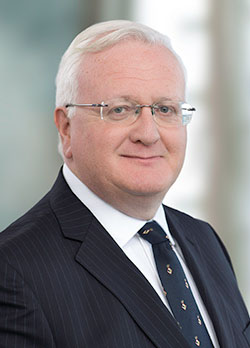Dr Vincent Power: Brexit deal will only be the start of the process

Dr Vincent Power
Dr Vincent Power, head of the EU, competition and procurement group at A&L Goodbody, considers the likely outcome of the Brexit negotiations.
Like all good soap operas, viewers of Brexit wonder whether there will or won’t be a deal by 11pm Irish time on Friday 29 March 2019.
The odds are in favour of a deal. This is partly because so many politicians are calling out the possibility of a no-deal scenario to dampen expectations. This is also because the track record of the EU is to do deals very late in negotiations - often after the deadline has passed. The Grexit, Lisbon, Maastricht, Euro-Crisis, Empty Chair Crisis and other negotiations all point to a deal being done. The deal done at the last minute is often an imperfect one in which the can is kicked down the road.
Most politicians don’t want to be seen to be incapable of doing the deal, so the odds are good the European Council will pull it off.
Theresa May’s comment that 95 per cent of the deal is agreed is encouraging. The text published on 19 March 2018 is also encouraging because there has been seven months of work since. What could cause problems is not the officials or the EU, but the lack of agreement on the UK side - rarely has one country been in such disarray about its negotiating stance. The contrast between one state at sixes and sevens with itself, and the seemingly united 27 member states will be a case study for diplomats forever.
But why no deal now? First, a deal can come too soon. A deal now would be susceptible to political, legal and media attacks. There is time for one, if not two, UK general elections if the deal is done too early. This is about corralling all the parties at the last minute, with Brexiteers pleased the UK is finally leaving, and Remainers glad that it is not so bad. But few in the UK will be happy and that is one of the enormous future challenges for the UK post-March 29.
Secondly, deals in the EU tend to be done by the European Council - the prime ministers of 27 states and the French president. This is the final court of political appeal in the EU. It was always improbable Barnier and Davis/Raab were going to be let clinch the deal.
But what type of deal? It took the UK two attempts and 12 years to join a simpler European Community in 1973. Unravelling 46 years of EU law in the UK could not be done in less than two years.
There will not be a comprehensive deal. That was always impossible and it became less likely given the disunity on the UK side. It will be a skinny deal. Indeed, the original EEC Treaty was not complete when it was signed on 25 March 1957 - the six founding states took a chance it would be ready by 1 January 1958, when it entered into force. They were right. We may see the same again.
Instead, there will be a series of deals over time. In some ways, that is not a bad thing. More might be achievable in calmer, cooler times. To return to the soap opera analogy, there will be a box set of agreements which will run and run.
The Irish issue might be partly resolved with more to be done later - one can recall that Ireland had to be resolved before last Christmas, otherwise talks would not progress. The EU would be wise not to long-finger, or leave unresolved, the Irish question.
The point that there will be many agreements to be concluded over time, and for as long as the EU and the UK exist, has been lost on most people. This is not the beginning of the end. It is barely the beginning of the beginning. Norway and Switzerland have to conclude agreements with the EU over time and the same will apply between the UK and the EU, whether those agreements are on transport, financial services, security, data or whatever - the neighbours will have to agree on issues which have not yet been imagined.
So there will probably be a deal, but a skinny one and the first of many to come. It will also be very late - even beyond the deadline of 11pm on the fascinating Friday night.

- Dr Vincent Power is head of the EU, competition and procurement group at A&L Goodbody. View his profile here. This article first appeared in the Irish Independent.










